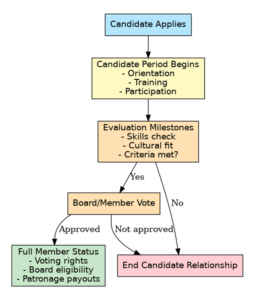🕒 3-Minute Read
Bringing someone into your cooperative is a big deal. You’re not just hiring an employee, selling a share, or signing up a customer. You’re inviting someone to help own, govern, and shape your business.
That’s why many cooperatives have a candidacy period before someone becomes a full member. During this time, the co-op and the candidate both get to see if it’s a good match.
We’re talking about candidates, not “probationary members.” That word “member” matters in law. In many states, including Colorado, if you call someone a “member” in your bylaws, they may gain certain legal rights right away—even if you meant something different. Using a term like “candidate” keeps everyone clear about where things stand.
Why Have a Candidate Period?
Think of the candidate period as a trial run for both sides. It gives:
-
- The co-op a chance to confirm the person’s skills, participation, and alignment with values.
- The candidate a chance to learn how the co-op works and decide if it’s the right fit.
It’s also a great time for training on governance, finances, and the legal rights and responsibilities of membership.
What Rights Do Candidates Have?
This is up to the co-op, and the rules should be written down in the bylaws or membership policy. In most co-ops, candidates:
Usually have:
-
- Access to certain meetings and information.
- Opportunities to work or transact with the co-op.
- Training and mentorship.
Usually don’t have:
-
- Voting rights on major decisions.
- The ability to serve on the board.
- Immediate cash payouts of patronage (though some co-ops accrue them for later).
The Colorado Example
Colorado law doesn’t require or define candidate periods. But under the Colorado Uniform Limited Cooperative Association Act, co-ops can create different membership classes and non-member stakeholder roles.
That means your bylaws can:
-
- Require a training program or work period before admission.
- Limit rights during candidacy.
- Make admission to membership a clear, intentional decision.
The key is clarity. If you want someone to become a member later, don’t call them one now.
How to Structure a Candidate Period
Here are the elements most co-ops include:
-
- Length – Often 3–12 months, or until set requirements are met.
- Criteria – Such as completing training, hours worked, or participation in meetings.
- Decision-making – Who decides on admission and how.
- Clear rights and limits – So there’s no confusion.
- Exit process – If the candidate isn’t admitted, explain what happens next.
Risks to Avoid
-
- Giving away rights you didn’t mean to.
- Treating candidates like unpaid labor if they’re actually employees.
- Letting the process drag on too long and feel like a barrier.
Bottom Line
A thoughtful candidate process makes membership stronger. It helps ensure that when someone becomes a member, they’re ready—and the co-op is ready for them. Clear policies, consistent application, and a welcoming culture make all the difference.
Candidate-to-Member Flowchart
Usually, the process goes like this:

Ready to Strengthen Your Co-op’s Membership Process?
If your cooperative is thinking about adding a candidate period, revising your bylaws, or clarifying membership rights, let’s talk. We work with cooperatives across Colorado and beyond to design governance systems that are legally sound, fair, and easy to understand.
You can reach us at info@jrwiener.com to schedule a consultation. Together, we can help your co-op welcome new members with confidence.
